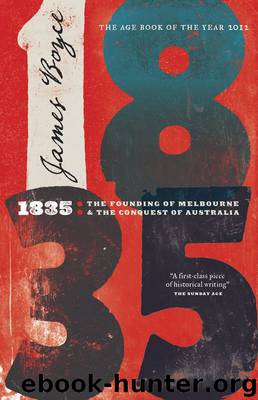1835: The Founding of Melbourne & the Conquest of Australia by James Boyce

Author:James Boyce [Boyce, James]
Language: eng
Format: epub
Tags: HIS004000
ISBN: 9781921870958
Publisher: Black Inc.
Published: 2013-02-28T13:00:00+00:00
expedite the general occupation by the people of this Kingdom or their descendents of those vast territories, in which our national wealth and industry have already, in the last half century, converted an unproductive waste into two great and flourishing provinces. In producing and multiplying such results as these, it has, I believe, always occurred, and is perhaps inevitable that the sanguine ardour of private speculation should quicken and anticipate the more cautious movements of the Government.30
How did the ‘dangers and calamities’ of January become an exemplar of the ‘sanguine ardour of private speculation’ by April? And why did the British government, at the height of evangelical political concern for native peoples, decide to approve the private conquest of Aboriginal land, even though as recently as December 1835 the South Australian Commissioners had only broken their deadlock with the government by offering to ‘give precise and positive instructions’ to prospective settlers ‘not to colonize any district which the Aborigines may be found occupying or enjoying or possessing any right of property in the Soil’?31 Moreover, the Colonial Office had recently rejected a private scheme to colonise New Zealand and was still immersed in its South African intervention, in which the seizure of Xhosa land was to be reversed.
In considering the dramatic policy change, it is first necessary to remember that Glenelg’s two dispatches were addressed to different men. In January 1836 Lieutenant Governor George Arthur, normally highly skilled in dealing with the Colonial Office, was experiencing the loss of trust and influence which would soon contribute to his recall. Arthur’s biographer, A.G.L. Shaw, has observed that ‘During the English winter of 1835–36 criticism of Arthur was constant,’ and at least in the short term it had a significant effect on his reputation in London.32 The Colonial Office also had serious concerns about unauthorised expenditure and there had been understandable disquiet when the British government was belatedly advised during 1835 that the Tasmanian Aborigines did not want to be on Flinders Island and how few of them were still alive.33 The news that the Aborigines were dying out in their imposed exile was guaranteed to disturb even the most pragmatic evangelical soul, and probably played a role in the firm rebuff given to Arthur’s proposals concerning the colonisation of Port Phillip. One of the Association’s lobbyists, Joseph Ball, experienced the result of Arthur’s loss of influence: ‘I found after dancing attendance for months I could get nothing from the Colonial Office and the circumstance of Colonel Arthur’s recall has been much against any interest there.’34
The recent focus on South African affairs had, by contrast, turned Governor Bourke into something of an evangelical hero. Bourke’s policy in the Cape in the late 1820s had provided what was increasingly portrayed as a template for humanitarian colonisation, and it lent credibility and influence to his views on pastoralism (the Cape was also sheep country) and native peoples. The fact that Bourke was a close friend of the former Colonial Secretary and current Chancellor of
Download
This site does not store any files on its server. We only index and link to content provided by other sites. Please contact the content providers to delete copyright contents if any and email us, we'll remove relevant links or contents immediately.
| Arms Control | Diplomacy |
| Security | Trades & Tariffs |
| Treaties | African |
| Asian | Australian & Oceanian |
| Canadian | Caribbean & Latin American |
| European | Middle Eastern |
| Russian & Former Soviet Union |
The Secret History by Donna Tartt(19086)
The Social Justice Warrior Handbook by Lisa De Pasquale(12190)
Thirteen Reasons Why by Jay Asher(8909)
This Is How You Lose Her by Junot Diaz(6886)
Weapons of Math Destruction by Cathy O'Neil(6279)
Zero to One by Peter Thiel(5801)
Beartown by Fredrik Backman(5754)
The Myth of the Strong Leader by Archie Brown(5507)
The Fire Next Time by James Baldwin(5442)
How Democracies Die by Steven Levitsky & Daniel Ziblatt(5218)
Promise Me, Dad by Joe Biden(5153)
Stone's Rules by Roger Stone(5087)
A Higher Loyalty: Truth, Lies, and Leadership by James Comey(4962)
100 Deadly Skills by Clint Emerson(4925)
Rise and Kill First by Ronen Bergman(4788)
Secrecy World by Jake Bernstein(4753)
The David Icke Guide to the Global Conspiracy (and how to end it) by David Icke(4717)
The Farm by Tom Rob Smith(4507)
The Doomsday Machine by Daniel Ellsberg(4490)
